No Matter
Before the final fight with Xemnas begins, he confronts the protagonists Sora and Riku, nearly pleading with them to recognize his understanding of himself, saying that if the concept of light and darkness are eternal, then the idea of nothingness, of Nobodies, of himself must also be eternal. Sora and Riku reject this, saying that while the abstract ideas behind light, darkness, and even nothingness may be eternal, Xemnas the entity is not. Xemnas laughs, turns deadly serious, and says with finality:
No more eternal than that radiance of yours.
I have been thinking about this line for sixteen years.
In fact, I think it is fair to say that I’ve been nothing short of obsessed with this line and Xemnas himself ever since I first played through Kingdom Hearts II back in 2006. This is one of those odd lines in a JRPG that sticks out from the rest and burrows into my head, just begging to be analyzed and dissected further so that I might use it as a cipher to understand not only Xemnas, but also the broader point of the game itself. Xemnas is a character that appears on screen in cutscenes for less than twenty minutes in the original game, and yet his presence and this line are so memorable that I routinely ponder the ideas of character agency, identity, and, ultimately, deep loneliness that Kingdom Hearts II so deftly explores.
To understand Xemnas is to understand this game; so now, let us go together on that journey to understand this line and the man who says it.
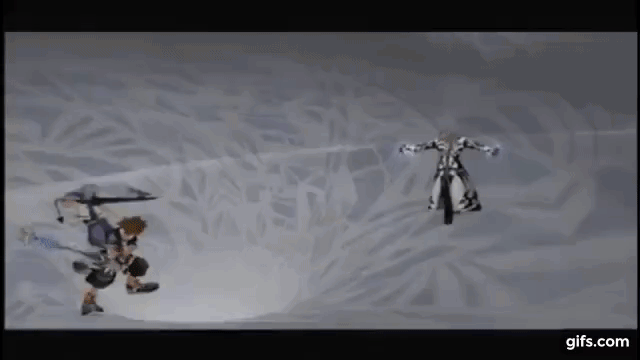
The final confrontation between Xemnas and our heroes.
DISCLAIMER
This article examines Xemnas as a character specifically as he is written in Kingdom Hearts II and does not take into account revelations added in later installments of the franchise. Consider this a discrete reading of Kingdom Hearts II as a text.
What You Think
Before we can interpret Xemnas and his role in the greater narrative of Kingdom Hearts II, we must first understand what the game tells us he is: a Nobody.
When a person loses his heart, he becomes a bestial creature known as a “Heartless.” The Heartless were the primary enemies in the first Kingdom Hearts game and were depicted as being vicious animals devoid of reason or logic, simply seeking out more hearts to steal in a mindless effort to bolster their ranks and spread darkness throughout the worlds. In Kingdom Hearts II, Master Yen Sid explains that when a person of strong heart and will loses his heart, they will sometimes leave behind an empty shell separate from their Heartless form that will begin to act on its own. This entity is called a “Nobody,” described as nothing more than a husk incapable of truly feeling any kind of emotion. They may pretend to feel and even exhibit emotions like a real person, but we are explicitly told time and time again that this is a ruse, a trick, and that Nobodies cannot truly experience anything because they do not truly exist at all.
Xemnas and the rest of the antagonistic Organization XIII are then revealed to be a special group of these Nobodies capable of thought and reason, and, unlike their Heartless counterparts, they appear to be planning and working together towards a shared goal. Our primary interaction with the members of the Organization is through singular boss fights where Sora and company face off against one member at a time. Even in the final level, or world, of the game, The World That Never Was, we run through a gauntlet of the last remaining members of the Organization one after the next, building our own cast of playable characters as we knock these Nobodies down as if they were single pieces on a chess board. Even though these Nobodies have banded together, given themselves a collective name, and are ostensibly working towards the same goal, we never see them working in tandem to fight the protagonists, accomplish simple tasks, or even help one another.

One of the few times we see multiple members of the Organization in one place: their introduction to Sora.
A Nobody, it would seem, is an entirely lonely creature. And yet, would a Nobody care that it is lonely? Given what the game tells us about how they are incapable of human emotion, would they even have the faculty to recognize their lack of connection with each other, or how terribly sad their insular nonexistence is? If their existence is a trick, on whom exactly is that trick being played?
To gain some insight into this question, let us turn now to the relationship between Axel and Roxas to see how this lonely trick plays out.
What You Feel
It is important to note that Master Yen Sid explains to Sora (and, by extension, to the player) that Nobodies are incapable of truly experiencing emotion directly after one of the most emotionally effusive parts of the game.
The opening to Kingdom Hearts II follows the story of Roxas and Axel, two Nobodies and members of Organization XIII. After abandoning the Organization for reasons to which we are not yet privy, Roxas is secreted away to a constructed digital world called Twilight Town where he has forgotten who he was and the people he knew during his time in the Organization. Axel, sent by Xemnas to retrieve Roxas and bring him back into the fold, all but begs Roxas to remember who he is, because they were best friends when Roxas was still in the Organization. Roxas, unfortunately, does not remember who Axel is until far too late in this opening sequence.
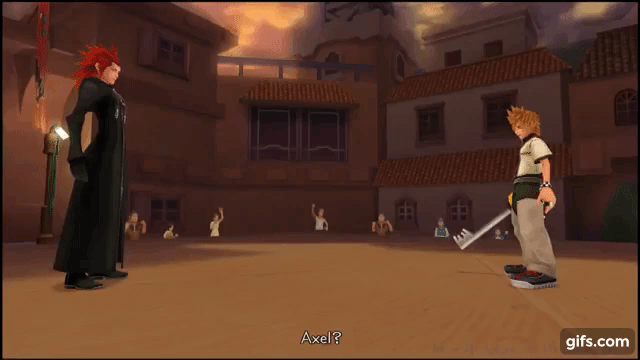
Before we are explicitly told that Nobodies cannot feel emotion, we see firsthand that Axel is devastated by the loss of his friend. We see a moment in flashback between the two of them when Roxas left the Organization with Axel pleading him not to go:
“You get on their bad side and they’ll destroy you!” He says, exasperation evident in his voice.
“No one would miss me,” Roxas replies as he walks away from his companion.
“That’s not true,” Axel says, dejectedly looking at the ground. “I would.”

Then, when Axel finally finds where his friend has run off to, he realizes that Roxas has no memory of him whatsoever. This connection that he clearly felt with his friend has been severed, and instead of feeling nothing or not reacting like we may expect of a Nobody, Axel confronts Roxas in a rage, desperately hurt that this person could forget him so easily. One cannot play through the fight between Roxas and Axel and come away with the understanding that these two characters are not truly exhibiting palpable, real emotion, and yet directly after the fight, we are reminded that these characters, these Nobodies, do not truly exist. They cannot feel loneliness; they cannot experience longing; they exist outside the emotion that we experience as a player while going through their story. This world in which they exist is fabricated for us, the player, and in a haunting way, they are not playing a trick on us by showing these intense feelings: they are having a trick played on them, experiencing these emotions in a fake, digital world that, like them, does not truly exist.
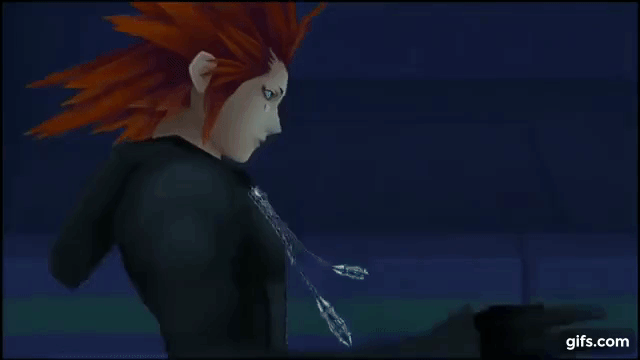
Between the tragic vignette of Roxas and Axel and the description of Nobodies given to us by Master Yen Sid, it would seem at first glance that Kingdom Hearts II is at odds with itself in explaining what these characters are meant to be. On the one hand, it certainly seems that these Nobodies can experience emotion, and yet, on the other hand, we are told at many points throughout the narrative that they do not. If we look at these people not as “Nobodies,” but as characters within a video game, we can say that Kingdom Hearts II is exploring what it means to be a character in a game’s story, and how much emotion we imbue into these characters when we see them on screen. In a way, perhaps it is true that these characters don’t experience real emotion the way that we, the player, would, but we act as surrogates for them, experiencing their trials and tribulations as they are presented to us. In that way, a Nobody cannot truly feel, and yet the emotions they exhibit are just as real to us.
But what if a character decided that wasn’t enough? What if a video game character, a “Nobody,” realized that there was some force outside of themselves with more agency, more power than they themselves could actualize? What if a Nobody tried to really, truly exist?
Enter Xemnas.
How You Exist
Now that we have a better understanding of how Kingdom Hearts II has set up its characters, let us take a closer look at Xemnas’ goal. We realize halfway through the game that Organization XIII has been goading Sora into destroying as many Heartless as possible because when a Heartless is destroyed with the Keyblade, the heart trapped within them is released back to Kingdom Hearts, which we know from the first game is an amorphous location that binds all creation together. The reason for this, we are told, is that if enough hearts return to Kingdom Hearts, there is a chance that Organization XIII and the rest of the Nobodies may find their own hearts and become full, actualized people once more in a world that Xemnas himself has created.
So, in short, we are told that Xemnas’ goal throughout the game is to become a whole person again and exert dominion over his new world.

Xemnas pleading with his artificial Kingdom Hearts.
Through interactions with the main characters and his former teacher, Ansem the Wise, we see that Xemnas is gesturing towards some force outside of himself that guides the world he inhabits. He understands this force as the heart itself, imbuing those who truly understand it with an agency that allows them to control the world around them. After the initial confrontation with Xemnas and Sora, Xemnas prostrates himself in front of Kingdom Hearts, begging it to realize that his understanding of the heart shows that he deserves that agency.
That fool Ansem said the heart’s true nature was beyond his understanding, but it’s not beyond mine! Hearts are the source of all power!
I would assert that in this speech regarding power and the heart, Xemnas is kenning towards the fact that there exists something outside of his own world that can, on occasion, imbue the people living in that world with true agency. It is easy to think of this force as the connection that the player has with the playable characters Sora and Riku: namely, the agency we give to these characters as they progress through this story gives them not only direction, but also purpose; they are the heroes of the story by virtue of our control over them. Sora and Riku truly exist because they are somehow connected to this force, and if Xemnas could only tap into that force himself, then he too could be a fully actualized person with reason and purpose. He could cease to be a Nobody and come out on the other side with a true understanding of the way this world works. On some level, he is aware that this force, the heart, is the agency we exhibit on those playable characters.
There is a difference between Nobodies and the main playable characters, and it is just that: the player is involved with their actions, and the Nobodies are doomed to follow a destiny that is not theirs to decide. And yet, in his last moments, Xemnas seems almost glib about this, and we come to this line with which I have been obsessed.
Before the final battle, Xemnas argues that the concepts on which the game has been centered—light, darkness, and nothingness—are eternal and therefore provide purpose to those who exist within those categories. Light and darkness provide the conflict, and the Nothings that lie in the margins are the ones to carry out that conflict. So in that sense, surely if these abstract concepts like light and darkness can have meaning assigned to them, then those Nothings, those Nobodies, can, too. Sora and Riku rebut him, saying that while those ideas may go on forever, the people who represent those ideas do not: they fade away and come to an end.
Before the final fight begins, we have two characters controlled by the player squaring up against an antagonist who is not, and they all but tell him that that paradigm means he is destined to fail. When Sora tells him that he himself is not eternal, Xemnas responds:
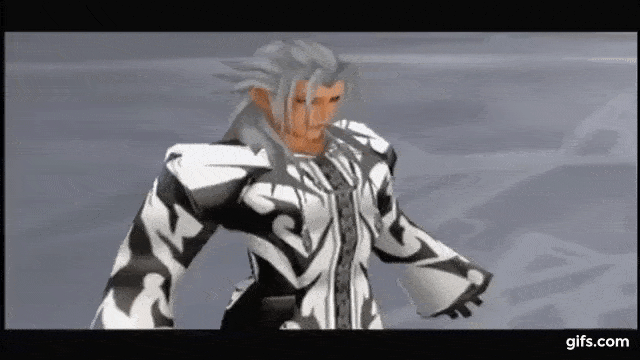
No more eternal than that radiance of yours.
This last line before he resigns himself to the final fight with the protagonists indicates, I think, that Xemnas is aware of the player in the sense that there is a force guiding Sora and Riku outside of the paradigms of Xemnas’ existence. Beyond light, darkness, and even nothingness, something has differentiated Sora and Riku from him, and while he may never know what that truly is, he has enough understanding of it to recognize that it is no less fleeting than light, darkness, or nothingness. One way or the other, each character standing at the edge of existence during that final fight will cease to fully exist once that force, the player, steps away from the story.
The true tragedy of Xemnas, of the Organization, and of Nobodies broadly speaking is that they will never reach that reality themselves, destined to fade into nothingness with their connections having only as much power as that fleeting force provides them.
After all, a Nobody can never really, truly exist.
Unfortunately, I don’t.
Xemnas—and, by extension, the Nobodies in Kingdom Hearts II—ask us to reflect on the agency with which we imbue these characters and the impact that has not only on us, but also on them. When we load a game, it may seem that the story was meant to play out exactly as it does, but what if it didn’t? What if we do not start with Sora, but instead with some character named Roxas? Isn’t there some possibility that, in another world, we may have begun a game as Xemnas and imbued him with that agency he was so desperately seeking? This game makes us think about not only what we owe to characters like Axel, Roxas, and Xemnas as we experience their heartaches, but also what we take from them when we do.
For as much as we may feel when we pop a disc in and play a game, perhaps we should think about our own trick we may unwittingly be playing on these poor Nobodies.


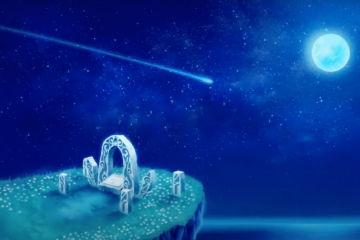
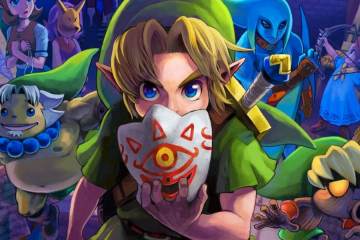
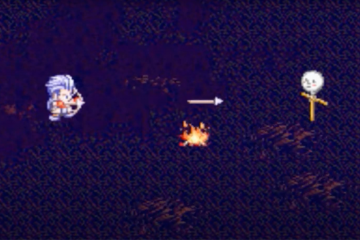
2 Comments
Andrew` · May 21, 2021 at 2:52 pm
I certainly thought the beginning portion of this article hinted at a delve into individual character’s reconciliation with their own existentialism, but the pivot to the meta-narrative about the game as a whole and how a player/reader interacts with it was very interesting! In addition, though you limit your analyses to KH2, I absolutely think your conception ages well given recent developments in the series.
Luke · April 17, 2022 at 11:58 am
That last line of the article…whoa. Well done!